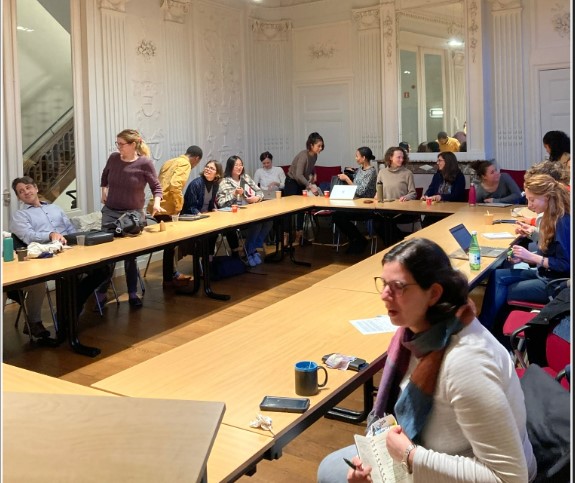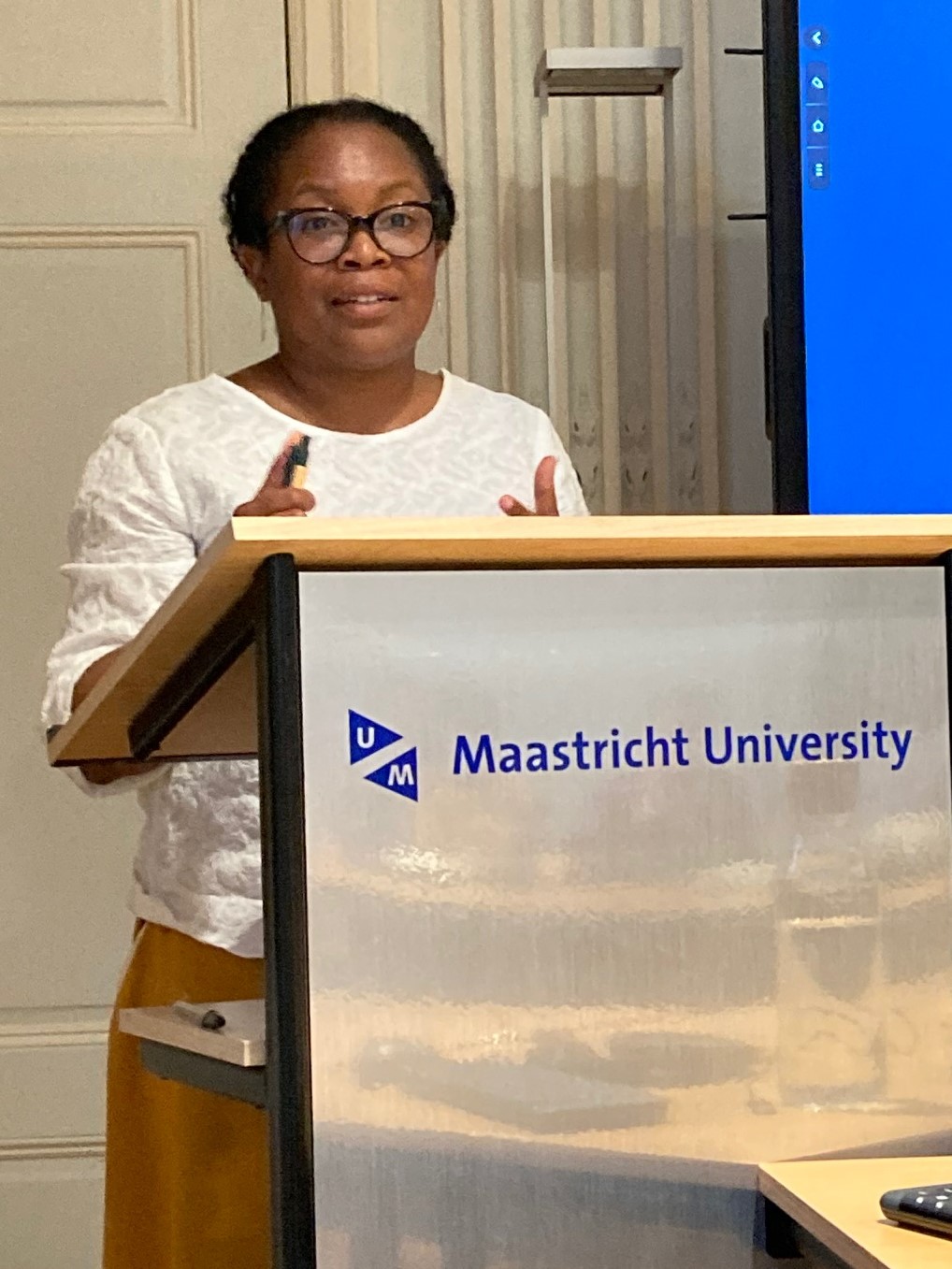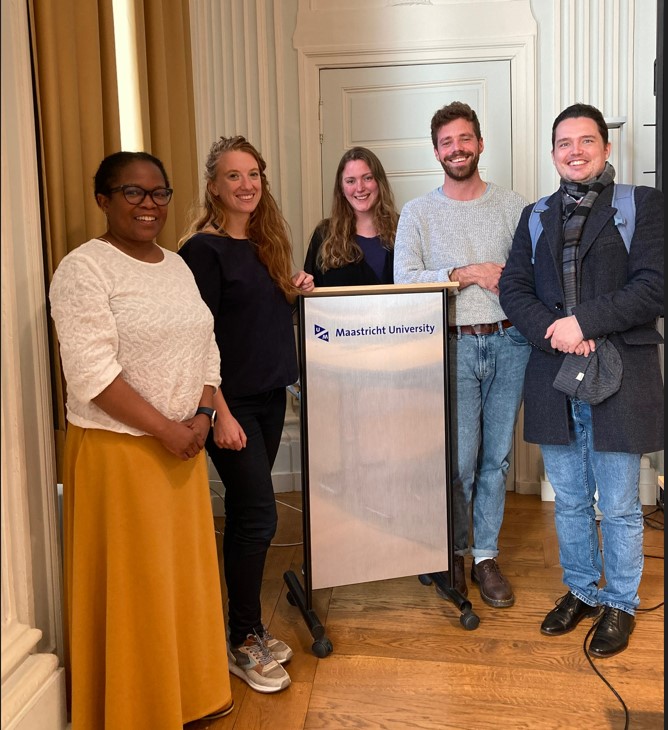Workshop and Lecture by Prof. Nolwazi Mkhwanazi
On Wednesday 2 November 2022, the Centre for Gender and Diversity hosted a workshop and a lecture by the medical anthropologist Prof. Nolwazi Mkhwanazi of the University of Pretoria. These CGD events were organized by Karlien Strijbosch, PhD candidate with a project that focuses on how Senegalese returnees navigate masculine dignity and vulnerability in relation to the European migration regime with a focus on marriage and sexuality. Prof. Mkhwanazi is interested in issues relating to life course, kinship and care. While she has also done research on ageing and care, her main focus has been on young people, reproduction, sexuality and gender. These are all topics close to the heart of the Centre for Gender and Diversity.
The morning program was a workshop led by Mkhwanazi with five scholars on the topic
of “Researching Gender, Sexuality and Health beyond European contexts.” These early career scholars presented work in progress and shared the dilemmas that they encountered in their fieldwork. Presenters were Pieter du Plessis (Maastricht University, Teaching fellow, Philosophy/CGD), Ricky Janssen (Maastricht University, PhD candidate Faculty of Health, Medicine and Life Sciences), Karlien Strijbosch (Maastricht University, PhD candidate, Globalization, Transnationalism and Development/CGD), Arthur Holavins (Maastricht university, Postdoctoral fellow Faculty of Health, Medicine and Life Sciences), and Annelien Bouland (University Carlos III Madrid, postdoctoral fellow). The session was concluded with lunch and a group photograph.


Later in the afternoon, Prof. Mkhwanazi gave a lecture on “The politics of care: Making and unmaking families in South Africa” to a Research program colloquium of Globalisation, Transnationalism and Development, co-hosted by the CGD. It was attended by 25 people consisting of CGD members, GTD members, and the students from master of Globalisation and Development. In her lecture Prof. Mkhwanazi considered how South Africa is characterised by vast inequality, and this matters on a daily basis. She highlighted the ways in which the making and unmaking of families is linked to the ability to provide care. She also drew attention to how obligations of care are variously complicated by intergenerational dynamics.
Biography:
Nolwazi Mkhwanazi is Professor of Anthropology at the University of the Pretoria. She joined the Centre for the Advancement of Scholarship (CAS) in September 2021. Prior to this (2017-2021), she was the Director of the Medical Humanities program at the Wits Institute for Social and Economic Research (WiSER), University of the Witwatersrand.

In the last 5 years she has been working more broadly with young people regarding issues of sexuality, sex education and sexual health interventions. In this work, her fieldwork sites span across Southern Africa including Botswana and Eswatini, and she has collaborated with people in range of disciplines including fine art, biomedical sciences, public health, demography and other social science disciplines. These collaborative projects include partners based in the global South, mainly in Ghana, Mozambique, Malawi, Kenya, Chile and India. In her current project: Reimagining Reproduction: making babies, making kin in Africa, Nolwazi is working with scholars in Eswatini, Ghana, Malawi, South Africa and Uganda. She is also part of a research team working on the project Urban Enclaving Futures in Accra, Maputo and Johannesburg.
Nolwazi is co-editor of two books: Young families: Gender, sexuality and care (HSRC Press 2017) and Connected Lives: Families, households, health and care in South Africa (HSRC press 2020). She is working on a third book with (Lakshmi Lingam), Mobile phones, gender and society: Emerging empirical realities and feminist perspectives (Routledge: forthcoming).
Nolwazi is on the editorial board of the journals: Anthropology Southern Africa; Agenda; The Ethnographic Edge, Medicine Anthropology Theory and Somatosphere, and the book series: Medical and Health Humanities: Critical interventions (Bloomsbury Press). She is on the advisory board of the Hamwe Festival (University of Global Health Equity, Rwanda) and is one of the founders of the Medical and Health Humanities Africa (MHHA) network.